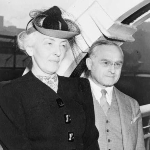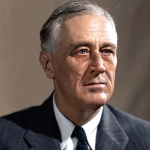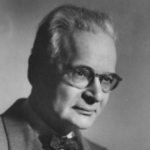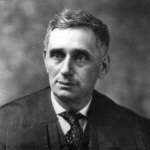Background
Felix Frankfurter was born on November 15, 1882 in Vienna, Austria-Hungary. He was the third of six children of Leopold Frankfurter and Emma Frankfurter. At the age of twelve, his family moved to the United States.

New York City, New York, United States
Felix Frankfurter graduated from the College of the City of New York in 1902.
Cambridge, Massachusetts, United States
In 1906 Felix Frankfurter received a Bachelor of Laws degree from the Harvard Law School.
Felix Frankfurter
Felix Frankfurter
Felix Frankfurter with Franklin D. Roosevelt, Jr. and Eleanor Roosevelt in Hyde Park, New York.
Felix Frankfurter with Allan F. Smith, April 1954
Felix Frankfurter
Felix Frankfurter attending Senate Hearing on his appointment to the Supreme Court.













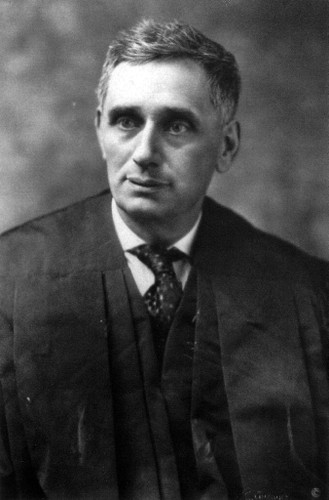

(This classic volume, first published in 1928, originated ...)
This classic volume, first published in 1928, originated in a series of articles written by Frankfurter, then a professor of law at Harvard University, and his student, Landis, for the Harvard Law Review. These articles chronicled and analyzed the many judiciary acts that were passed between 1789 and 1925, and illuminated the intimate connection between form and substance in the life of American law. For instance: When a community first decided to enact zoning laws - the Supreme Court had to approve. When the United States made a treaty with Germany following World War I - the Supreme Court had to define the limits and meaning of the treaty. Newly reissued with an introduction by constitutional expert Richard G. Stevens, The Business of the Supreme Court is still as fresh and relevant today as it was when first published. It is a work that will aid the student of the law to both love the law and remain true to its purposes.
http://www.amazon.com/gp/product/B0747RKWRJ/?tag=2022091-20
1928

(This excellent treatise was prompted by the conviction of...)
This excellent treatise was prompted by the conviction of its authors that an understanding of the actual functioning of the injunction in labor disputes is possessed by very few persons and that only through general widespread knowledge of the facts will corrective regulation of this troublesome instutuion be made possible.
http://www.amazon.com/gp/product/B000X9P60W/?tag=2022091-20
1930

(The power of the commerce clause touches most intimately ...)
The power of the commerce clause touches most intimately the relations between government and economic enterprises, and the process by which the conflicting claims of the nation and states are mediated through the Supreme Court is of continuing interest. This study is a clear exposition of the various interpretations of the commerce clause under three great chief justices. Originally published in 1937.
http://www.amazon.com/gp/product/1469609622/?tag=2022091-20
1937
Felix Frankfurter was born on November 15, 1882 in Vienna, Austria-Hungary. He was the third of six children of Leopold Frankfurter and Emma Frankfurter. At the age of twelve, his family moved to the United States.
Felix Frankfurter graduated from the College of the City of New York in 1902. In 1906 he received a Bachelor of Laws degree from the Harvard Law School.
Following a short stint with a private law firm on Wall Street, where Felix Frankfurter represented corporate interests, he was appointed in 1906 to serve for the next four years as assistant of Henry Stimson, the United States attorney in the Southern District of New York, prosecuting white-collar criminals. In 1911, he was named solicitor to the federal Bureau of Insular Affairs (now Office of Insular Affairs).
In 1914, Frankfurter returned to Harvard Law School, as professor of law. His tenure as professor was marked by his intellectual honesty and rigor. Teaching only students of high academic standing, he tirelessly explored the law's complexities and reveled in its nuances, helping his classes see both the gray areas and the bright lines. During World War I, Frankfurter was advisor and counsel to several government agencies, and in 1919 served as President Woodrow Wilson’s legal advisor at the peace conference in Versailles.
During the 1930s, Frankfurter served as an adviser to the National Association for the Advancement of Colored People (NAACP). President Roosevelt rewarded Frankfurter with an appointment to the United States Supreme Court in 1939 after the passing of Justice Benjamin N. Cardozo. During his tenure, he took a firm stance on protecting the integrity of the Federal Government. He evinced toward federal and state legislative action a hands-off attitude similar to that of his friend Justice Oliver Wendell Holmes. His insistence on freedom of expression was partly offset by his disinclination to uphold the civil liberties of political radicals, especially members of the United States Communist Party during the "witch hunt" of the 1950s. Frankfurter retired from the Supreme Court in 1962, and died three years later on February 22, 1965, in Washington, D.C.
Felix Frankfurter was an eminent Associate Justice of the United States Supreme Court. He was known for his twenty three years service in this position and for consistently applying the theory of judicial self-restraint. Frankfurter helped develop many aspects of President Roosevelt's New Deal programs. He brought together the legislative engineers who drafted the Securities Act of 1933, which today remains a prominent piece of federal law regulating the trading of stocks and bonds, and helped formulate the Utility Holding Company Act. Frankfurter was involved in numerous cases of national prominence: the Scopes trial (1925), the silk strike in New Jersey, and the attempt to suppress the "American Mercury" in Boston.
His influence while he was at Harvard was widespread. Many of his students, after graduation, went into government service, especially during the early New Deal period. He helped many of them obtain a clerkship with one of the United States' leading judges, including Oliver Wendell Holmes Jr., Louis D. Brandies, and Learned Hand.
(This excellent treatise was prompted by the conviction of...)
1930(The power of the commerce clause touches most intimately ...)
1937(This classic volume, first published in 1928, originated ...)
1928Felix Frankfurter was a non-practicing Jew, and regarded religion as "an accident of birth".
Felix Frankfurter claimed that he was not a member of any political party. In the 1920s and 1930s, he supported a number of liberal causes, including President Franklin D. Roosevelt's New Deal. His actions as a Supreme Court Justice cannot adequately be characterized as liberal or conservative but are most accurately described as exhibiting a consistent pattern of judicial self-restraint.
Felix Frankfurter's philosophy of judicial restraint gave greater weight to federal or state legislative action than to individual rights or the victims of legal injustice. In "Wolf v. Colorado" (1949), he insisted that the evidence illegally seized did not have to be excluded by the court, and in "Baker v. Carr" (1962), he unsuccessfully argued that inequitable legislative representation is a "political controversy" not subject to judicial review. Thus, Frankfurter’s pre-court liberal reputation gave way to a conservative label at a time when the liberal philosophy called for an active judicial process.
He was also a Zionist, and came to prominence as a founder of the American Civil Liberties Union in 1920, an organization created to protect the constitutional rights of members of ethnic, religious, and racial minorities.
Quotations:
"Litigation is the pursuit of practical ends, not a game of chess."
"There can be no security where there is fear."
"The real rulers in Washington are invisible, and exercise power from behind the scenes."
"Answers are not obtained by putting the wrong question and thereby begging the real one."
"It simply is not true that war never settles anything."
Felix Frankfurter was member of the Phi Beta Kappa.
Felix Frankfurter was outgoing and energetic, and he thrived on bare-knuckled intellectual debate. This endeared him to his friends but alienated others.
In 1919, Felix Frankfurter married Marion Denman. The couple had no children.
